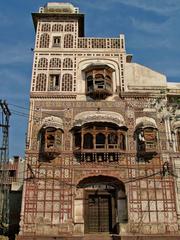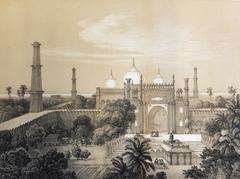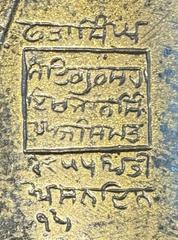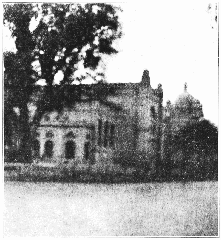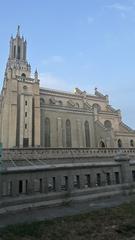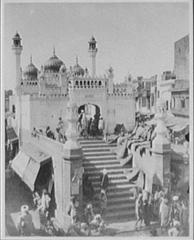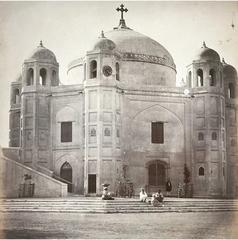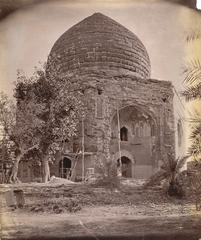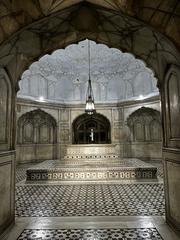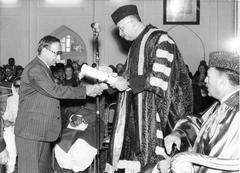
Iqbal Park Lahore: Visiting Hours, Tickets, and Historical Significance
Date: 03/07/2025
Introduction
Greater Iqbal Park, commonly known as Iqbal Park, is an iconic landmark and one of the largest urban parks in Lahore, Pakistan. Located at the heart of the city, the park seamlessly blends Pakistan’s historical, cultural, and recreational heritage. Its significance is rooted in pivotal events, most notably the adoption of the Lahore Resolution in 1940, which laid the foundation for the creation of Pakistan (Dunya News; Zameen.com). Today, with its expansive green spaces, historic monuments, and modern amenities, Greater Iqbal Park stands as a symbol of national pride and public life.
This guide offers a detailed exploration of Iqbal Park’s historical evolution, practical visitor information (including visiting hours and ticketing), and travel tips to help you experience the best of this treasured Lahore landmark.
Table of Contents
- Introduction
- Historical Background
- Visitor Information
- Architectural and Cultural Heritage
- FAQs
- Conclusion
- Sources
Historical Background
Mughal and Sikh Eras
The grounds of present-day Greater Iqbal Park trace their origins to the Mughal era, when this area was a lush expanse of royal gardens and fruit orchards adjacent to the Lahore Fort and Ravi River. The lawns and orchards, renowned for almonds, mangoes, and plums, served as ceremonial grounds for Mughal emperors’ military parades and public events (Dunya News). Under Sikh rule (from 1799), the grounds became known as the ‘Parade Ground,’ retaining their military and communal significance (Wikipedia).
Colonial Period: Minto Park
After the British annexation of Lahore in 1849, the area was repurposed for the British military’s use and renamed ‘Minto Park’ in honor of Governor-General Lord Minto (Dunya News). The park became a focal point for military drills, public gatherings, and civic events, with its identity reflecting colonial authority and urban transformation.
The Lahore Resolution
The most defining moment in the park’s history came on March 23, 1940. At the annual session of the All-India Muslim League, the Lahore Resolution (Pakistan Resolution) was presented and adopted here, demanding independent states for Muslims in British India. This event, attended by tens of thousands, set the ideological groundwork for the creation of Pakistan in 1947 (Zameen.com; Pakistan Traveler). The selection of this venue was symbolic, given Lahore’s historical role as a center of Muslim culture and politics.
Post-Independence Developments
After Pakistan’s independence, the park was renamed ‘Iqbal Park’ to honor Allama Muhammad Iqbal, the poet-philosopher whose vision inspired the Pakistan Movement (Wikipedia). The construction of Minar-e-Pakistan (1960–1968), a monumental tower symbolizing the Lahore Resolution, marked the park’s transformation into a national monument (Rising Pakistan). Designed by Nasreddin Murat-Khan, the 70-meter-tall structure is a blend of Mughal, Islamic, and modern architectural styles and remains a prominent feature of Lahore’s skyline (Pakistan Traveler).
Ongoing Social and Political Importance
Since independence, Greater Iqbal Park has served as a central venue for political gatherings, national celebrations, and cultural events. Major rallies, patriotic festivities such as Pakistan Day, and community activities regularly take place here, reflecting its ongoing significance as a symbol of unity and civic engagement (Samaa TV; Zameen.com).
Visitor Information
Opening Hours
Greater Iqbal Park is generally open daily from 7:00 AM to 10:00 PM. During national holidays or special events, hours may be extended or adjusted. It’s advisable to confirm timings from official sources before your visit.
Tickets and Entry Fees
Entry to the park and Minar-e-Pakistan is free of charge, making it a highly accessible destination. Some internal attractions, such as the National History Museum or boat rides on the artificial lake, may have nominal fees. Tickets for these activities are available onsite and are typically inexpensive. At present, there is no online ticketing system for attractions within the park.
Accessibility and Facilities
- Wheelchair Access: The park offers paved pathways, ramps, and accessible restrooms.
- Parking: Ample parking is provided near the main entrance.
- Restrooms and Water: Clean restrooms and drinking water stations are located throughout the park.
- Seating and Shade: Benches, shaded shelters, and open-air seating areas are available.
- Internal Transport: Buggy rides and a soft rail (mini-train) help visitors navigate the expansive grounds for a small fee.
- Food Courts: Multiple kiosks and stalls serve local and international cuisine.
- Safety: Security personnel are present, particularly during peak times and events.
Guided Tours and Travel Tips
- Guided Tours: Local tour operators offer guided excursions focusing on the history and architecture of the park and Minar-e-Pakistan. Audio guides and informational plaques further enrich the visitor experience.
- Travel Advice: Visit on weekdays or early mornings to avoid crowds. Wear comfortable shoes, bring sun protection, and carry water, especially in summer.
- COVID-19 Protocols: Follow local health guidelines, including mask-wearing and social distancing as required.
How to Get There
Centrally located near Azadi Chowk, Iqbal Park can be reached via public transportation (such as the Lahore Metrobus at Azadi Chowk Station), taxis, rickshaws, or private vehicles.
Main Attractions
Minar-e-Pakistan
A towering symbol of Pakistan’s independence, Minar-e-Pakistan commemorates the historic 1940 Lahore Resolution. The monument’s design integrates Mughal, Islamic, and modern influences, with inscriptions in multiple languages at its base. Illuminated at night, it is a focal point for national celebrations and photography (Paradigm Shift; Travel Pakistani).
National History Museum
Opened in 2018, this digital museum takes visitors on an immersive journey through Pakistan’s history, independence movement, and cultural evolution. It features multimedia exhibits and virtual reality experiences.
Artificial Lake and Musical Fountain
The four-acre lake offers boating and features an 800-foot musical fountain with evening water, light, and music shows—a favorite with families.
Gardens and Walkways
Lush, landscaped gardens and scenic walkways provide tranquil spots for relaxation, picnics, and photography.
Children’s Playgrounds
Multiple playgrounds equipped with modern play structures, swings, and shaded seating areas make the park family-friendly.
Other Notable Sites
- Tomb of Allama Iqbal: Adjacent to the park, honoring the poet-philosopher.
- Tomb of Hafeez Jalandhari: Inside the park, commemorating the national anthem’s author.
- Proximity to Lahore Fort and Badshahi Mosque: Both are UNESCO World Heritage Sites and can be visited alongside the park (The History Hub).
Architectural and Cultural Heritage
Greater Iqbal Park’s evolution encapsulates Lahore’s multi-layered history:
- Minar-e-Pakistan: Embodies the nation’s struggle for independence.
- Lahore Fort and Badshahi Mosque: Showcase Mughal grandeur and religious architecture.
- Samadhi of Ranjit Singh: Highlights the city’s Sikh heritage.
- Tombs of National Figures: Reflect Pakistan’s literary and intellectual legacy.
The park’s transformation—from Mughal gardens through colonial parade grounds to a post-independence national symbol—mirrors the broader historical currents that have shaped Lahore and Pakistan (Wikipedia).
FAQs
Q: What are Greater Iqbal Park’s opening hours?
A: The park is open daily from 7:00 AM to 10:00 PM, but hours may vary during special events.
Q: Is there an entry fee for the park or Minar-e-Pakistan?
A: No, entry is free. Some attractions, like boat rides or the museum, may charge nominal fees.
Q: Are guided tours available?
A: Yes, guided and audio tours are available, enhancing your understanding of the park’s history and architecture.
Q: Is the park accessible to wheelchair users?
A: Yes, paved paths and accessible facilities are provided.
Q: What are the main attractions near Iqbal Park?
A: Badshahi Mosque, Lahore Fort, Allama Iqbal’s Tomb, and Shalimar Gardens are all nearby.
Conclusion
Greater Iqbal Park is a living monument to Pakistan’s historical journey, blending cultural heritage, recreation, and natural beauty. Its generous opening hours, free general entry, and proximity to other major Lahore landmarks make it a must-visit for locals and tourists alike. Explore the park’s monuments, gardens, and museums, attend its vibrant events, and immerse yourself in the story of Pakistan’s past and present.
For up-to-date visitor information, guided tours, and exclusive travel tips, download the Audiala app and follow related social media channels.
Visual Recommendations
- Panoramic view of Greater Iqbal Park with Minar-e-Pakistan (alt: “Panoramic view of Greater Iqbal Park Lahore with Minar-e-Pakistan”)
- Minar-e-Pakistan illuminated at night (alt: “Minar-e-Pakistan illuminated at night in Greater Iqbal Park”)
- Map of park and nearby historical sites (alt: “Map of Greater Iqbal Park and nearby Lahore historical sites”)
- Visitors enjoying the musical fountain and artificial lake (alt: “Visitors enjoying the musical fountain and artificial lake at Greater Iqbal Park”)
Internal Links Suggestions
- Related articles on Lahore Fort, Badshahi Mosque, and Pakistan Day celebrations for enhanced user engagement.
Sources and Further Reading
- Dunya News
- Zameen.com
- Paradigm Shift
- Travel Pakistani
- Startuppakistan.com.pk
- Medium.com
- Wikipedia
- The History Hub
- Pakistan Traveler
- Rising Pakistan

